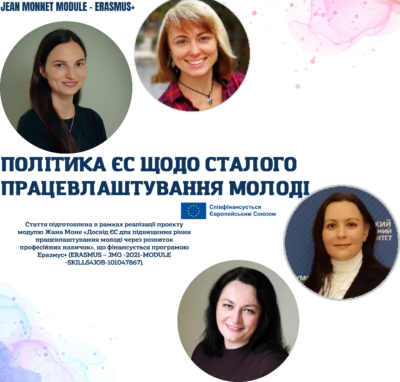Research aimed at increasing the level of youth employment is extremely relevant in today’s rapidly changing labor market. The development of professional skills adapted to European standards opens up new opportunities for young professionals and increases their competitiveness. The Jean Monnet SKILLS4JOB module “EU Experiences for Enhancing Youth Employability through Professional Skills Development” provides unique opportunities for in-depth study of these issues, contributing to the formation of professional competencies that meet the requirements of the European labor market.
During the implementation of educational and scientific activities within the Jean Monnet SKILLS4JOB module, the author’s team consisting of Associate Professors of the Department of Accounting and Taxation Yulia Serpeninova and Nataliia Vynnychenko, as well as Associate Professors of the Department of International Economic Relations Oksana Zamora and Tetiana Shcherbyna prepared scientific articles in professional publications.
We invite everyone to familiarize themselves with the results of scientific research within this project!
1. EU policies for sustainable youth employment
The article examines the legal framework for youth employment policy, including employment policy aimed at recovery from the pandemic. The main acts of regulatory regulation of youth employment policy in the EU are the following: The European Pact for Youth, the Resolution “Youth Employment Crisis: A Call to Action”, the “Framework for Action on Youth Employment”, the EU Council Recommendation “On the Establishment of a Youth Guarantee”, and others. The purpose of European regulations on the employment of young people is to support talented and promising young people capable of adapting to the labor market, while improving the macroeconomic situation in independent member states.
The article analyzes European programs and initiatives aimed at reducing youth unemployment, as well as improving education and labor mobility. The main European programs and initiatives are identified: NextGenerationEU, the Strategy “Youth – Investing and Empowering”, the Initiatives “Youth Opportunities”, “Engaging Youth in Employment”, “Investing in Europe’s Youth”, etc. They envisage creating more opportunities for young people in education and employment, improving access to and full participation in society, developing skills relevant to the labor market, supporting first work experience and on-the-job training, etc. The author emphasizes the need for EU member states to stimulate economic growth, focusing on the youth segment, by implementing employment support programs adapted to the current situation in the world.
The article can be found at the link:
https://visnyk.fem.sumdu.edu.ua/issues/3_2022/9.pdf
https://essuir.sumdu.edu.ua/handle/123456789/89442
2. Gran funding opportunities within the 2021-2027 EU programme for professional development of Ukrainian citizens.
The article is dedicated to the spectrum of grant funding tools that the European Union offers to youth and adults to support their personal and professional development, as well as to promote active citizenship and social integration. It explores and details the features, main objectives, and budgets of EU grant programs available for the 2021-2027 period, including: Erasmus+, Creative Europe, and the European Solidarity Corps, aimed at supporting and developing cross-sectoral and other modern skills among Ukrainian citizens, particularly the youth. The article also discusses a wide range of European platforms available to Ukrainian citizens during wartime, including opportunities for education, scientific activities, business development, and the film industry. A full spectrum of institutions and initiatives offer support in the form of grants, scholarships, employment, and other types of assistance to Ukrainian scholars working in Ukraine or abroad during the war.
The article can be found at the link:
http://ppeu.stu.cn.ua/article/view/286495
https://essuir.sumdu.edu.ua/handle/123456789/96343
3. Intercultural competence as a key professional skill for graduate students entering the workforce
The article explores the significance of intercultural competence as an integral part of market-oriented professional skills required in today’s globalized world. The authors analyze the key components of intercultural competence, such as cognitive, affective, behavioral, and motivational aspects, which together promote effective interaction in culturally diverse environments. Special attention is paid to the role of higher education in developing these skills through the integration of international exchange programs, experiential learning, intercultural training, and seminars. The research emphasizes that developing intercultural competence is critical for a successful career in the global labor market, where culture and communication become significant factors. The study highlights the importance of incorporating intercultural competence into academic programs to prepare students for work in multicultural environments. It is noted that intercultural competence enhances communication skills and improves the ability to solve problems, lead teams, and adapt to different cultural contexts.
The full text of the article is available here:
https://www.nayka.com.ua/index.php/ee/article/view/5067
https://essuir.sumdu.edu.ua/handle/123456789/97362
4. EU experience in ensuring transparency and publicity of reporting on the use of funds under EU programs
The purpose of the article is to study the EU experience of ensuring transparency and publicity of reporting on the use of funds under EU programs by examining the key elements of such a system in order to develop directions for improving the existing system of transparency and publicity of the use of financial resources in Ukraine. This will create the preconditions for reducing corruption risks and increasing the level of trust of the international community in the process of spending funds received under the programs to support Ukraine. A comprehensive study of the experience of using funds under EU programs and projects will contribute to the use of best European practices to further create open and accessible mechanisms for controlling financial transactions that ensure transparency in the use of funds.
The article is available at the link:
https://a-economics.com.ua/index.php/home/article/view/55
https://essuir.sumdu.edu.ua/handle/123456789/97361
Funded by the European Union. However, the views and opinions expressed are those of the authors alone and do not necessarily reflect the views of the European Union or the European Executive Agency for Education and Culture (EACEA). Neither the European Union nor EACEA can be held responsible for them.
